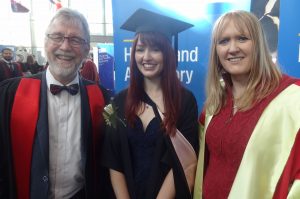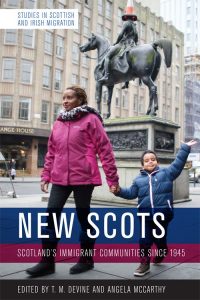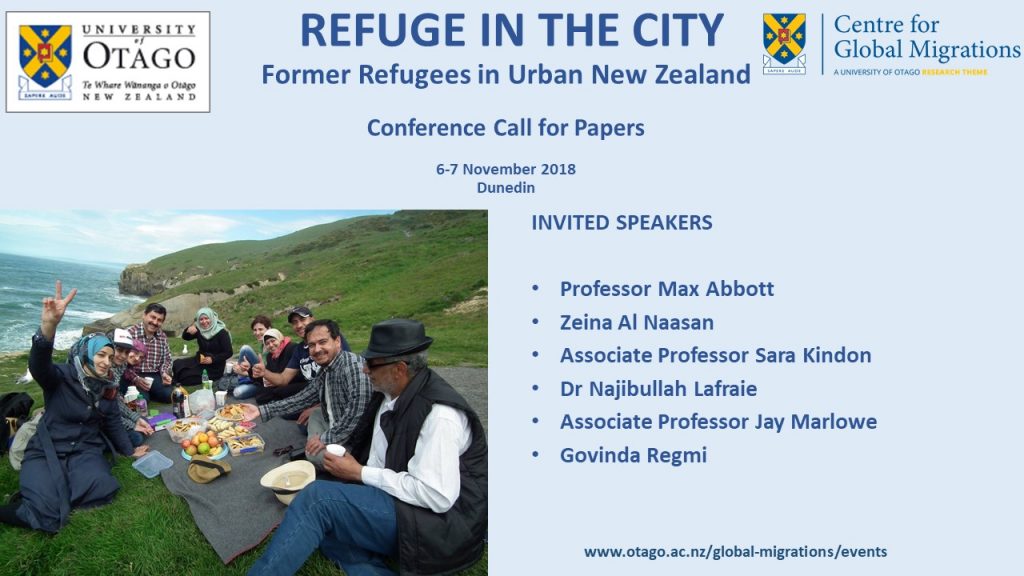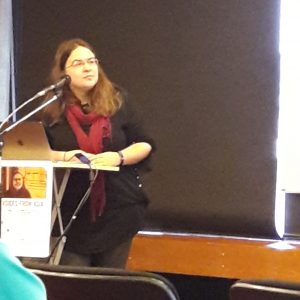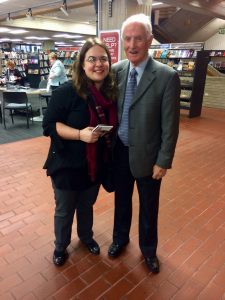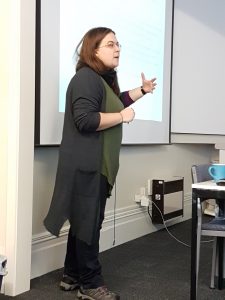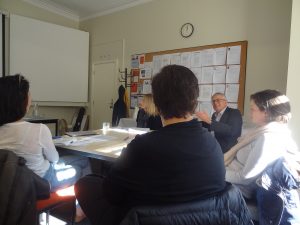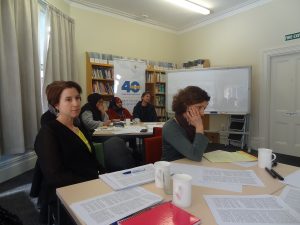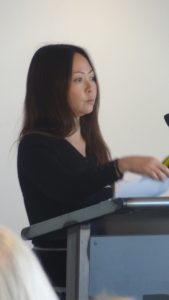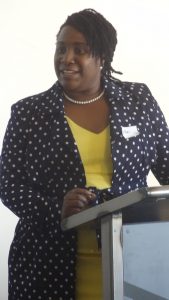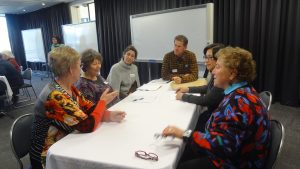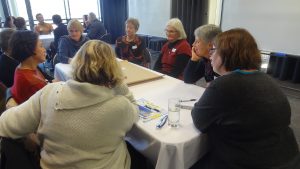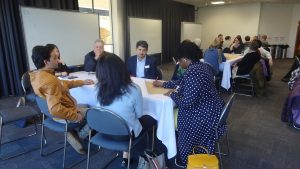Our member Peita Ferens-Green graduates MA with distinction
We are delighted that one of our postgraduate members, Peita Ferens-Green, has graduated with a First Class Honours Masters degree.
Peita’s thesis, supervised by our director, Professor Angela McCarthy, and History staff member Associate Professor John Stenhouse, examined the working life of Thomas Ferens, a migrant from Durham to early Otago.
Thesis Abstract
This thesis is a case study of Thomas Ferens, a Methodist lay preacher from England. Utilising personal testimony, it follows his life in New Zealand from 1848 – 1888, focussing upon his various occupational pursuits to explore how his sense of ‘self’ affected his migrant experience, analysing how he navigated life in the settlement, and how he was influenced by the world around him. Typically, migrant scholars using personal testimony focus on those of a (literate) middle to upper class status. A focus on Ferens, however, provides a working-class perspective. He similarly offers a perspective on Methodists in the Scottish Presbyterian Otago settlement. This work engages with studies of missionaries, religion in New Zealand, intercultural relations and constructs of self/other. It also addresses the impact of runholding and declaration of hundreds in North Otago and the need for personal mobility, both geographical and occupational, in this early period of settlement.
New Scots: Scotland’s Immigrant Communities since 1945
Our Centre Director, Professor Angela McCarthy, and Centre Steering Group Member Professor Sir Tom Devine have recently had their edited collection New Scots: Scotland’s Immigrant Communities since 1945 published by Edinburgh University Press as part of their Studies in Scottish and Irish Migration series. The book is one of four publications to emerge from a 3-year (2014-2016) Economic and Social Research Society (UK) funded seminar series on Scotland’s diasporas in international comparative context.
The book is the first wide-ranging, cross-disciplinary overview of immigration to Scotland in recent history and its impact on both the newcomers and the host society. It examines key themes relating to postwar migration by showcasing the experiences of many of Scotland’s most striking immigrant communities of people arriving from England, Poland, India, Pakistan, China, the Caribbean and the African continent. New Scots also features analysis of asylum seekers and refugees, along with Jewish and Roma migrants, and includes a chapter on migrant voting patterns during the Independence Referendum of 2014. Framed in chronological, thematic and international contexts, New Scots offers its readers a penetrating understanding of immigration, one of the most crucial issues confronting the United Kingdom today.
Edinburgh University Press is currently offering a special 30% discount on the book, valid until 31 October 2018 New Scots Flyer (500KB).
Contents
1. Introduction: Scotland’s New Immigrants, T.M. Devine and Angela McCarthy
2. Invisible Migrants? English People in Modern Scotland, T.M. Devine
3. ‘New’ Jews in Scotland since 1945, Nicholas J. Evans and Angela McCarthy
4. The Migration and Settlement of Pakistanis and Indians, Stefano Bonino
5. Immigration to Scotland from Overseas: The Experience of Nurses, Ima Jackson
6. Polish Diaspora or Polish Migrant Communities? Polish Migrants in Scotland, 1945-2015, Emilia Piętka-Nykaza
7. Education and the Social Mobility of Chinese Families in Scotland, Eona Bell
8. African Migrants, Asylum Seekers and Refugees: Tales of Settling in Scotland, 2000-2015, Teresa Piacentini
9. ‘Race’, Place and Territorial Stigmatisation: The Construction of Roma Migrants in and through Govanhill, Scotland, Ashli Mullen
10. Migration, Engagement and Constitutional Preferences: Evidence from the 2014 Scottish Independence Referendum, Ailsa Henderson, Chris Carman, Rob Johns and James Mitchell
11. Immigration to Scotland since 1945: The Global Context, Enda Delaney
Refuge in the City: Former Refugees in Urban New Zealand conference programme
The provisional programme for our Refuge in the City: Former Refugees in Urban New Zealand conference is now available: Refuge in the City programme 15 oct 2018 (PDF 126KB).
The two-day event will open with personal accounts from Dr Najibullah Lafraie, Govinda Regmi and Zeina Al Naasan, three former refugees, recounting their experiences in moving and settling in New Zealand from Afghanistan, Bhutan and Syria.
We also have three keynote lectures from Professor Max Abbott, Dr Sara Kindon, and Dr Jay Marlowe examining the past and present, place, and social media.
Panel sessions include speakers reflecting on space and place, education, health and wellbeing, and social support and social change.
We are greatly looking forward to the event and registration details will be available soon.
Applications open for 2019 Visiting Scholar
Applications are now open for our Global Migrations 2019 Visiting Scholar. The scholarship provides up to NZ$4,000 for scholars with expertise in migration who wish to develop new or existing collaborations with our Centre members.
The Visiting Scholar should plan to visit Dunedin, New Zealand, between 1 July 2019 and 31 May 2020, ideally coinciding with Otago’s teaching semesters (July-October 2019 or March-June 2020). The visit should be for a minimum of one week.
As well as developing new or existing linkages with Centre for Global Migrations member(s), the Visiting Scholar is also required to deliver a minimum of one public lecture and to hold a workshop with members of the Centre.
All applications must have the support of a Global Migrations Otago staff member. Please contact your proposed Global Migrations collaborator for an application form or, alternatively, email Professor Angela McCarthy at global.migrations@otago.ac.nz for an application form and/or further details.
The closing date for applications is 1 November 2018.
Information about our 2017 and 2018 Visiting Scholars is available on our website.
New Publication from Dr Greg Rawlings
Our member Dr Greg Rawlings from the Department of Anthropology and Archaeology has recently had his article on the British Nationality Act in Vanuatu published in the journal Twentieth Century British History. Advance online access to the article is here while the abstract is reproduced below.
Abstract
The British Nationality Act (BNA) of 1948 was designed to provide a form of supranational citizenship to accommodate the separate nationality provisions that were beginning to proliferate as a result of constitutional change within the late empire, decolonization and the formation of the Commonwealth. Under the provisions of the BNA, members of the Commonwealth would continue to be unified by transnational forms of citizenship, at least in principle. The Act aimed to cover every political arrangement conceivable in the late empire and early Commonwealth and contributed to the transformation of Great Britain into a multicultural society, by providing the legal vehicle for immigration into the UK in the second half of the twentieth century. However, the BNA had its limits. It could not be applied to territories characterized by constitutional exceptionalism and jurisdictional hybridity. In the Condominium of the New Hebrides, jointly governed by France and Great Britain from 1906 to 1980, the majority of the indigenous population were unable to benefit from the BNA, despite efforts to extend its coverage in all eligible territories. As part of the condominium agreement, the indigenous population were ineligible for any form of citizenship—British, French or New Hebridean—and remained stateless until independence as the Republic of Vanuatu in 1980. This article examines the relationship between indigenous statelessness and the BNA, exploring the implementation, interpretation and extent of the BNA in a territory characterized by constitutional hybridity, compromise and ambiguity. It argues that despite its emphasis on universal commonwealth citizenship, the BNA could not accommodate the diverse political, legal and constitutional diversity that characterized the Dominions, Crown Colonies, protectorates, protected states and condominia that had proliferated under imperial rule and whose legacies continued to inform the possibilities for decolonization and the politics of post-colonial citizenship making.
Report on Dr Cone’s Public Lecture: Voices from Asia: Narratives of Migrant and Refugee Women in Higher Education
Dr Tiffany Cone’s public lecture began with an overview of the Asian University of Women (AUW) before providing an outline of her current collaborative research on higher education and internationalisation.
Dr Cone advised that most academic women at her University were on full scholarships and many were from displaced backgrounds. They usually entered University after undertaking programmes to improve their literacy, numerical skills, communication in the English language and critical thinking.
Dr Cone’s current research project with Dr Vivienne Anderson of the Higher Education Development Centre at the University of Otago seeks to explore the reasons migrant and refugee women choose tertiary institutions, their sense of identity formation and belonging, similarities and differences between their narratives, and how the women’s narratives might suggest new ways of conceptualising internationalisation.
Drawing on rich personal testimonies within the AUW student body, Dr Cone noted that some students in the study envisaged ‘developing’ nations as more interesting and promising as postgraduate study sites than traditional ‘education provider’ countries. Most students communicated a desire to return to their homes after study in order to contribute to their communities.
In light of the women’s narratives, Dr Cone suggested a need to rethink internationalisation in relation to universities’ commitment to shared humanity rather than the global economy.
Workshop report: What does higher education internationalisation have to do with refugee resettlement?
On Monday 30 July 2018 Dr Tiffany Cone from the Asian University of Women gave a workshop to Global Migrations members and community contacts. The workshop comprised three parts: an overview of the Asian University of Women; an assessment of what is being done internationally to assist those of refugee background; and brainstorming recommendations for the tertiary sector.
The International and National Context: What is currently being done?
Institutions are doing good work to assist refugee background students including:
- access to online learning
- free language tuition
- funding and job placement
- full scholarships
- mentoring programmes
- establishing University clubs for refugees
- advising Equity Office of refugees’ needs
- recording refugees as an equity group (though not all self-identity this way because of the way refugee status is framed or they arrive young and do not identify that way)
Nevertheless, research with refugees reveals that they often encounter:
- alienation
- family and community demands
- lack of community support
- peer pressure
- English language difficulties
- financial hardship
- lack of any information about University programmes
In the New Zealand context key concerns include:
- finance
- immigration policies
- distance
- lack of knowledge
- New Zealand’s lesser reputation compared with the UK and North America
- lack of established ethnic communities.
At the same time, the country is attractive for allowing students to work and the possibility of pathways to permanent immigration.
Recommendations for the Tertiary Sector
The workshop concluded by developing some recommendations for the tertiary sector. Among the recommendations were:
- The need for universities to undergo a change in mindset to be less focused on profit-making and return to the core values of tertiary education. This includes the need for Otago University to explore the ways to fund 5-6 refugee background students to develop high-level English language skills for university entry.
- Institutions to learn from each other and develop collaborative strategic frameworks.
- Universities to consider how they might contribute to refugee resettlement by fostering work opportunities in the wider university environment (for example, in catering, gardening etc)
- Recognition of what refugee-background students bring to the tertiary sector.
Download Materials
- Dr Cone’s Powerpoint presentation Cone Workshop Powerpoint (419KB)
- Summary of key international developments to support refugees in the tertiary sector Higher Education and Refugee Resettlement (85KB)
Migrant Elder Care Workshop report
On 13 July 2018, the Centre for Global Migrations and Collaboration of Ageing Research Excellence hosted a joint symposium on migrant elder care. Five speakers traversed topics of care for Chinese elders, community gardening for senior migrants, interpretation issues for migrant elders, spirituality, and migrant care workers in elder care facilities.
Following the five presentations, participants moved into groups to brainstorm challenges within the migrant elder care sector. Key findings and recommendations include:
- Government should fix loopholes in the existing immigration legislation rather than close the family reunification category. For instance, migrant elders (grandparents) can visit New Zealand multiple times but only up to 6 months at a time with a maximum stay of 18 months in three years. This regulation fails to recognise the value that migrant elders (grandparents) have in providing long-term support and care to their children and grandchildren;
- For migrant elders in New Zealand, ascertain whether there is a need to establish a group to facilitate migrant elders to better connect with their local communities. If desirable, a key person needs to drive the initiative forward with support from a critical mass;
- Seek to facilitate group mingling between migrant elders of different ethnicities to develop cultural learning, respect and understanding.
- Recognise the need for a sustainable immigration policy to retain migrants, including a special category or better recognition for care workers. Current policy for an Essential Skills Work Visa in ‘lower-skilled employment’ stipulates that after three years in the country, applicants must spend a year outside New Zealand before being granted another visa. Under this category, applicants are also prevented from bringing their families to New Zealand to join them. This is problematic in light of the investment employers make in relation to job training etc.
- Recognise the demands on migrant care workers who often have to: refund a migration agent in their homeland; repay their families for financial support; provide remittances for their kin; and cover their own expenses. The practice of sending remittances back to points of origin could be alleviated if immigration policy permitted family reunification.
- Establish regular/ongoing workshops that support workers in the migrant elder care sector to better understand the impact of cultural perspectives in care homes.

